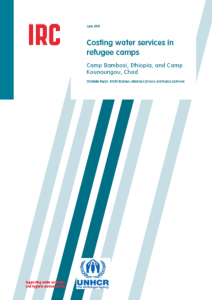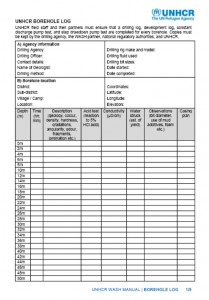
This report applies the life-cycle costs approach (LCCA) to the provision of water services in two UN refugee camps, Bambasi in Ethiopia and Kounoungou in Chad. It is based on cost data from financial reports in Geneva and both camps and on service-level data collected through the UNHCR monitoring system and on site through water point surveys.
The purpose of the study was (1) to better understand the structure, magnitude and drivers of the cost of providing a targeted level of water service to refugees, and (2) to reflect on the applicability of LCCA in the UNHCR monitoring framework and the potential for implementing it in systematically.

This document looks at drinking water, sanitation and renewable energy solutions and options in three camps in Dolo Odo with recommendations and conclusions.

The choice of sanitation technology in humanitarian crisis is based on various factors including the terrain, social and cultural norms and agency experience. There is the continued need for humanitarian response mechanisms to factor the environmental impact and sustainability of the technologies used in the provision of safe water supply and sanitation to affected communities. The acceptability of using ecological sanitation technologies such as Urine Diversion Dry Toilets (UDDT) in refugee contexts needs significant exploration. Using refugee camps in Dollo Ado as a case study, this paper outlines how the UDDT technology has been implemented in the context of protracted refugee camps, the successes and the areas needing further exploration to make it better able to be adopted across various refugee programmes and contexts.

Agency information Drilling Agency: UNHCR Drilling Officer: Mesfin Yagatu Contact Details: yagatu@unhcr.org 7882343 Name of Geologist: Ngusu Atamara Drilling Method: Rotary and DTH Drilling Rig Make and Model: PAT 301 Drilling Fluid Used: Foam Drilling Bit Sizes: 6″ 8″ Date Started: 12/04/2001 Date Completed: 17/04/2001 Borehole location District: Sherkole Zone ‘F’ Sub-district: None Village / […]
 English
English




